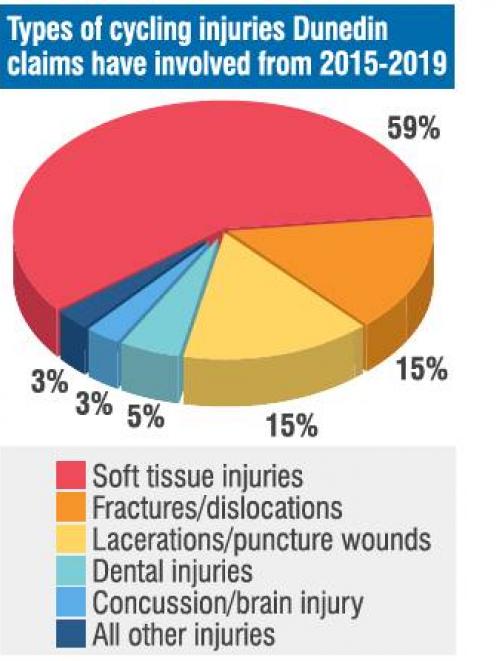In 2019, ACC was dealing with 1190 active claims related to cyclists, costing $1,881,545.
Add the cost of nine electric bike claims to that and the total reaches almost $1,900,000.
The actual cost of treatment would be higher again since the ACC figures do not include emergency public hospital treatment. The corporation bulk-funds district health boards for this.

The number of e-bike claims that year was less than four, costing only $232.
More than half of the Dunedin claims over the five years to 2019 were for soft tissue injuries.
The other most common claims were for fractures and dislocations, closely followed by lacerations and puncture injuries.
Between 2018 and 2019 there was a dramatic increase in Dunedin’s active injury claims from children in the 10-14 age group, up 48 from 67 to 115.
At the other end of the age range, in the 65-and-over category, the number last year was 76, compared with 44 in 2018.
The 60-64 age group cost ACC the most over the five years at $948,891, followed by those 65-plus on $858,642.
However, these groups did not have the highest number of active claims over the five years.
That slot was taken by the 15-19-year-olds on 423 for the five years, followed closely by 40-45-year-olds, with 419 active claims.
Although no context for the claim increases has been provided by ACC, it is likely the increased injuries reflect a rise in the number of people cycling.

The school taught cycle safety and mountain bike programmes at 27 schools in the city, coaching children on how to ride safely on the roads and on mountain bike tracks during their normal classes, physical education lessons or at school camps.
‘‘We hope this correlates with more children feeling safer, riding more efficiently and at a suitable speed,’’ Dr Hagen said.
The school was also fielding more inquiries for e-bike lessons, mostly for the older generations who would like to ride safely either on the roads in traffic or off road tracks.
The lowest number of cycling related claims is in the 0-4 age group.
Over the five years there were 176 Dunedin claims and ACC spent $19,980 on them.
There have been few claims related to electric bikes in Dunedin over the past five years, with fewer than four recorded for each year until last year’s nine.
It is possible the number is higher than that, because the information released by ACC relied on information on claimant’s accident description form.
Nationally, as e-bikes have increased in popularity, the number of e-bike cycling claims has risen.
In 2015 there were 53, rising to 704 last year. The cost also rose significantly in that time, from $67,328 in 2015 to more than $1.2 million last year.
Over the same time cycling injury claim costs, excluding e-bikes, have risen 47%, totalling $83.5 million last year across the country last year, relating to 53,112 active claims.
Comments
2 things you could take from this....
The money spent on cycleways is an absolute waste, or, cyclists aren't using them and getting into trouble that way.
Even with option 2, the cycleways were and are, a waste of money from the council (but we all knew that anyway)
So a lot more people choosing to cycle; infrastructure still isn't safe enough.
Best wrap these cyclists in cotton wool so as they don't cost us any more money than they already do.
Ok, here's a little story. I fell off my bicycle last month resulting in a double compound fracture. I was on a cycle path that is shared with pedestrians and I clipped one of the dividers as I was trying to avoid someone who was walking a dog ahead of me. So, the conclusion for me is, accidents will always happen. But let us consider what could have happened if the road didn't have the shared cycleway/footpath. If that had been the case (as it was till recently) I would have had no choice but to land in the road, the road that carries cars and buses which would have increased my chance of being hit by a vehicle. So, thank you DCC for reducing the risk for both myself and pedestrians. And thank you also to everybody who stopped to help me.
News about cycling and especially comments never get old. First people get mad that millions spent for infrastructure allegedly not used by anyone then very same folks not happy with strong evidence of the opposite.
Why not put it in the contexts with other roading costs? Other article mentions that maintenance (not even building) of existing Dunedin road network will cost hundreds of millions over next decade alone, now how is that efficient











